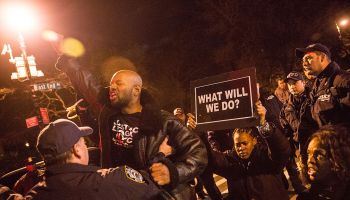CHICAGO — Fifteen incarcerated men who claim they were sent to prison by confessions that were beaten, burned and tortured out of them by convicted Chicago police Lt. Jon Burge and his officers are getting some high-profile help – including from a former Illinois governor.
In a friend-of-the-court brief to be filed Wednesday with the Illinois Supreme Court, ex-Gov. Jim Thompson and more than 60 current and former prosecutors, judges and lawmakers are asking for new evidentiary hearings for inmates who say their convictions were based on coerced confessions.
The brief marks the first effort on behalf of alleged Burge victims as a group and not separate individual cases, attorneys said.
Burge’s name has become synonymous with police abuse in the nation’s third-largest city, and more than 100 men – most of them African-American and Latino- have alleged Burge and his men tortured them from the 1970s to the 1990s.
Burge was convicted last year of lying about whether he ever witnessed or participated in the torture of suspects. He’s serving a 4 1/2-year sentence at Butner Federal Correctional Complex in North Carolina.
Burge never has faced criminal charges for abuse. He was fired from the police department in 1993 over the 1982 beating and burning of Andrew Wilson, a suspect later convicted of killing two police officers.
The brief “gives the Illinois Supreme Court the opportunity to finally and firmly repudiate the Burge era of the Chicago Police Department,” said Thompson, a former Republican Illinois governor and U.S. attorney.
Lawyers are filing the brief in the case of Stanley Wrice, an inmate who has been claiming since 1982 that he falsely confessed to a brutal sexual assault only after Burge’s officers beat him in the face and groin with a flashlight and a piece of rubber.
Wrice, 57, is serving a 100-year sentence. Attorneys say he’s one of the longest-serving inmates with a Burge torture claim.
Each of Wrice’s attempts for a new hearing had been turned down until December, when the appellate court granted him a new evidentiary hearing. Prosecutors looking to block the hearing asked the Illinois Supreme Court to take the case, and the justices agreed.
At issue before the high court is whether a coerced confession can ever be considered “harmless error” in a criminal trial, attorneys said. The special prosecutor’s office that’s handling Wrice’s case has argued that a conviction could stand – even if it involved a coerced confession – if the person could have been proven guilty without the confession.
Wrice’s case has gone farther than any other current claim involving Burge, and other inmates are either awaiting decisions or have given up, attorneys say. The brief to be filed Wednesday asks the high court to: order prosecutors to identify each inmate who claims their confession was coerced by Burge or his men; appoint lawyers to inmates who need them; order evidentiary hearings in the cases; and to order the Cook County Circuit Court to vacate the convictions of inmates whose convictions it was determined were based on coerced confessions.
Justices “have an opportunity to take control of this problem and to fix it,” said attorney Locke Bowman, who plans to file the brief. He’s represented several alleged torture victims who have been freed from prison and have civil suits pending against Burge.
The brief’s signers include both attorneys and advocates who have represented alleged Burge victims as well as former prosecutors, judges and politicians who have rarely, if ever, publicly weighed in on the Burge case.
“This brief is a group of non-usual suspects coming forward to implore the court to seize the opportunity to declare emphatically that torture has no place in our criminal justice system,” said Bowman, legal director of the MacArthur Justice Center at Northwestern University.
Former U.S. Attorney Thomas Sullivan said he signed on to stop the piecemeal approach the Burge cases have taken in the past.
“I feel that it’s important that there be a full judicial examination of what went on…not case by case,” Sullivan said.
Heidi Lambros, one of Wrice’s attorneys, said the friend-of-the-court brief was signed by “some heavy hitters” to help demonstrate an outside perspective on the case.
She said she is also pleased with a brief filed Tuesday by students working with the Chicago Innocence Project, who got affidavits from witnesses in the Wrice case who say they were tortured into implicating him.
Thompson said that while the hearings will take time and money, “the end is worth it.”
The Supreme Court could hear oral arguments in Wrice’s case as early as mid-September.
RELATED:
Organizers Protest California Prison Inmate “Abuse and Torture”
















